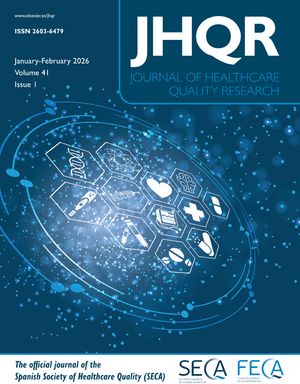Este trabajo pretende explorar las opiniones que sobre el aseguramiento de la calidad y la acreditación sanitaria tienen los directivos de los centros sanitarios españoles.
MétodoEncuesta de opinión por cuestionario semiestructurado para autocumplimentación elaborado ad hoc. El sistema elegido para su remisión fue el correo electrónico. Se realizó un análisis descriptivo, presentándose el porcentaje correspondiente para las variables cualitativas mientras que las variables cuantitativas se presentan en rangos y percentiles.
ResultadosLa tasa de respuesta alcanzada fue de 59 (24,1%), para el conjunto de los sujetos a estudio, y de 28,7% para el grupo de directivos de hospital. Un 70% consideró el tema de candente actualidad. El 98% opinó que la acreditación debe ser un requisito para concertar centros privados con la Administración sanitaria. Un 54% (frente a un 34%) se manifestó favorable a la obligatoriedad del proceso. El 75% de los directivos que contestaron a nuestra encuesta se manifestaron partidarios de un modelo único de acreditación para el conjunto de España. Respecto al resultado de la acreditación, los directivos consultados (76,8%) creen que éstos deben hacerse públicos y, en consecuencia, ser conocidos por pacientes y profesionales.
ConclusionesA diferencia del modus operandi de Reino Unido, los EE.UU. y Canadá, los directivos sanitarios españoles se decantan por la obligatoriedad del proceso, a semejanza del sistema sanitario francés. Las tres cuartas partes de los directivos interrogados comparten el criterio de la Subcomisión Parlamentaria para la Consolidación y Modernización del Sistema Nacional de Salud, hecho público el 18 de diciembre de 1997 en términos de expresar “la necesidad de impulsar la mejora continua de la calidad de la asistencia a través de un sistema general de acreditación de centros y servicios sanitarios consensuado por el Consejo Interterritorial”. No obstante, una tercera parte de los encuestados se manifiesta partidario del uso complementario de otros modelos, del tipo de ISO y EFQM.
The aim of this article was to determine’Spanish healthcare managers’ opinion about quality assurance and healthcare accreditation.
MethodA semi-structured ad-hoc questionnaire was sent to managers by electronic mail for completion. We performed a descriptive analysis, showing the results of the qualitative variables in percentages, and those of the quantitative variables in ranges and percentiles.
ResultsThe response rate was (59) 24.1% for the total number of persons included in the study and was 28.7% for the group of hospital managers. Seventy percent believed the issue to be highly topical. Ninety-eight percent believed that accreditation should be a requirement for private healthcare settings that are contracted by the public sector. Fifty-four percent (vs 34%) believed the process should be mandatory. Seventy-five percent of the managers who completed the questionnaire were in favor of a single accreditation model for the whole Spanish state. Most managers (76.8%) believed that the results of the accreditation process should be published so that patients and healthcare professionals could be aware of them.
ConclusionsUnlike the modus operandi in the United Kingdom, USA and Canada, Spanish managers believe that the accreditation process should be mandatory, as in France. Three-quarters of managers agree with the criteria of the Parliamentary Sub-commission for the Consolidation and Modernization of the National Health System, published the 18 December 1997, which expresses “the need to stimulate continuous quality improvement in healthcare through a general accreditation system of healthcare centres and services agreed by the Inter-territorial Board”. Nevertheless, one-third of the managers surveyed approves the use of additional models such as the ISO or EFQM.






